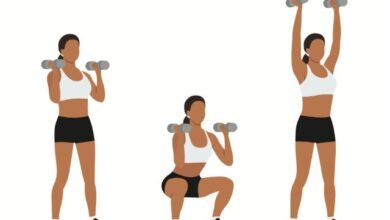10 Reasons You’re Not Losing Weight

Most dieters would agree that losing weight is almost always an exasperating process. Not only that, but following a diet while pursuing a social life can be nearly impossible. If you feel you’re doing all things right on your weight loss journey and still not attaining positive results, then listen up. We’re here with 10 real reasons you’re not losing weight. To learn everything that may cause your scale to stay stuck in neutral, Eat This, Not That! reached out to The Nutrition Twins®, Tammy Lakatos Shames, RD, CDN, CFT, and Lyssie Lakatos, RD, CDN, CFT, and Mike Bohl, MD, MPH, ALM, who sit on our Medical Expert Board. The experts reveal there are many simple new habits you can incorporate into your lifestyle right now that may be helpful in burning more calories.
Another great thought is to recruit a friend to share your weight loss journey with. Working out together, exchanging recipes, and encouraging each other to reach specific fitness or diet goals every week is a less lonely path—and actually fun! Dr. Bohl says, “Process goals are about the things you do to lose weight (like following a diet a certain number of days a week or going to the gym a certain number of days a week), and it can be motivating to have several small ‘wins’ by achieving process goals while you’re on your way to achieving your overall outcome goals.”
Don’t get discouraged, because there are so many avenues to explore when you’re struggling to lose weight. Take a look at these 10 real reasons why you’re not losing weight. And next up, don’t miss 10 Habits That Destroy Your Weight Loss Progress After 50.

The first important step to take is to discuss your weight, concerns, and weight loss goals with your physician. Being overweight or obese are medical conditions. It’s possible your weight can be a result of something like Cushing syndrome, a condition that leads to weight gain in the midsection.
Dr. Bohl explains that there are several various reasons why certain individuals hold onto excess weight. “The set point theory says that the human body tries to keep itself within a preferred range—which is different from person to person. So the number one reason you may be struggling to lose weight is because having excess weight is a medical condition, and losing weight may be physiologically more difficult for you than for other people,” he says.
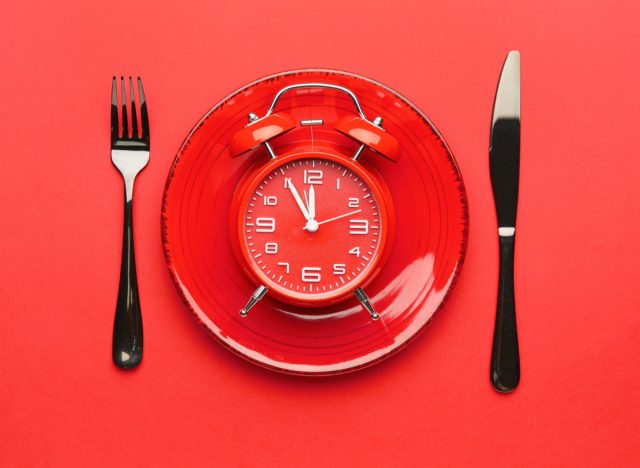
“Although time-restricted eating (only eating within a specific time window) can be beneficial in helping some people to lose weight, this backfires for others as they get overly hungry and overeat or binge when the fast is over,” The Nutrition Twins explain. In addition, intermittent fasting can derail your weight loss efforts if you can’t focus and feel tired while you’re fasting, which may lead to skipping out on calorie-burning activities or exercise.
Moral of the story? Intermittent fasting won’t deliver weight loss results for everyone. The Nutrition Twins warn, “Women must be especially careful not to overdo it as it can mess with their delicate hormone balance.” They add, “Pay careful attention to your body’s signals and how your body responds when you fast. If after 14 to 16 hours of fasting, your appetite is uncontrollable, try fasting for a shorter period of time, such as 12 to 14 hours instead. If you still end up overeating or if you are cutting back on your activity, it may be best to stick to 12 hours maximum.”

You may think you have your best weight loss interests at hand when opting for veggie chips, fresh fruit, or pretzels for snacks, and avoid unhealthy cookies, chips, or candy. But alas, these options will have you feeling hungry shortly after you finish them and craving more.
To avoid this, The Nutrition Twins suggest, “Be sure to include protein and fiber-rich foods when you snack. Protein and fiber slow digestion to keep you feeling satisfied and help to cause a gradual rise in blood sugar, preventing energy dips that trigger cravings.”
Consider enjoying pistachios for your next snack, which The Nutrition Twins dub “an ideal plant-based source of complete protein [and] a good source of fiber.” And according to a recent study by Cornell University, pistachios are chock-full of antioxidants, which “are superstars at taming the inflammation that makes weight loss harder.”
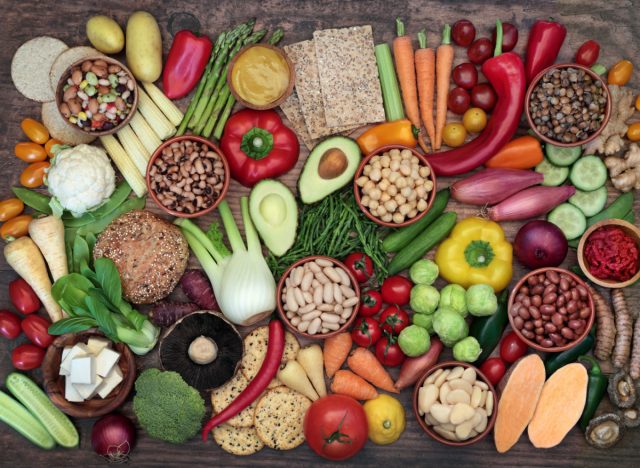
Eating plant-based foods comes with a plethora of health benefits, but The Nutrition Twins explain that going completely vegan without a careful plan set in place can easily derail your weight loss progress if you don’t incorporate enough protein. “Since most plant foods don’t contain much protein, it’s easy to fill up on carbs, especially refined grains like doughy carbs that cause blood sugar spikes and crashes and leave you hungry soon after,” they tell us. “This typically results in overeating, and often on carbs like calorie-dense pasta, pretzels, chips, and sugary snacks that can easily lead to weight gain.”
Before making the swap to 100% vegan, map out your meals and brainstorm ways you can incorporate more protein into each of them. Plant sources that are packed with protein include lentils, black beans, dried peas, chickpeas, or edamame, along with tofu, chia seeds, quinoa, and nuts.
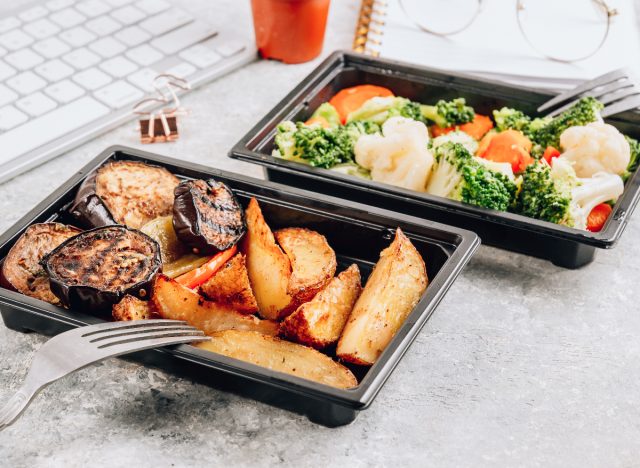
“We see this a lot—people with the best intentions to be healthier try to include more vegetables at meals, which is fantastic, but they don’t realize that the oil or butter that the vegetables are cooked in or marinated with can really add up,” The Nutrition Twins explain. “Some vegetables mop up the oil and butter even more, like eggplant, mushrooms, squash, and peppers, adding several hundred calories to each meal.”
But don’t stop ordering veggies—just ask for them steamed! If you need an extra flavor boost, squeezing fresh lemon or lime juice on your veggies is always a good idea. “It’s one of the best tricks that top chefs use and it’s perfect if you’re watching your waistline since it doesn’t add any calories,” The Nutrition Twins add. Or, ask the restaurant to incorporate spices and herbs like oregano, thyme, rosemary, dill, cumin, lemongrass, parsley, basil, cloves, or nutmeg, that’ll give those veggies a tasty flavor kick without the added calories.
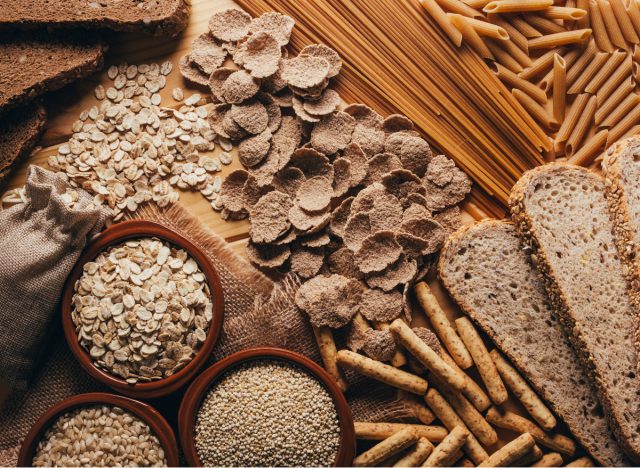
You may be under the impression that all carbs are bad when it comes to weight loss. That’s simply not the truth! It’s all about choosing just the right healthy carbs to work into your meals.
“Carbs are the fuel for your brain and your muscles, and when you cut them out, it’s not uncommon to feel exhausted and get intense carbohydrate or sugar cravings as your brain and body need a quick pick-me-up. This often results in bingeing on the very food you’re trying to avoid,” The Nutrition Twins explain.
In order to prevent this from occurring, be mindful of how you feel when you cut out carbs from a meal. Do you feel fatigued later on, or does this result in bingeing? “If so, make a conscious effort to include a small amount of wholesome carbs at each meal,” The Nutrition Twins suggest. “You may need to experiment a bit to determine your personal needs, but for example, start with one-half cup serving of oatmeal, brown rice, sweet potato, or quinoa per meal, as that may be enough to do the trick.”
If you’re still feeling tired and/or go on a binge afterward, bump up your carb intake a little more until you find the right amount that works.

Some medications cause weight gain, and there’s a possibility that your weight can be caused by something you’re taking, Dr. Bohl explains. Check with your doctor, as your condition may be treatable by a different medication. It’s definitely worth exploring!

It’s important to eat at a calorie deficit when shedding weight, which is consuming fewer calories than you torch. Some calories can be pretty sneaky, though, like alcohol and your morning coffee. Even fruit juices that come across as being “healthy” can be jam-packed with extra calories and sugar. It’s important to know everything you are eating—and drinking.
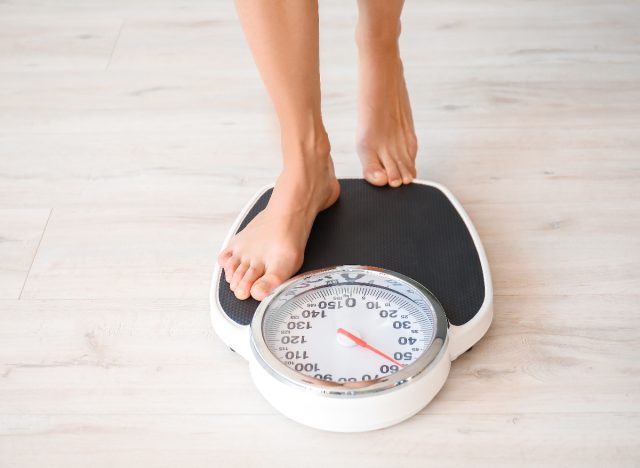
It’s common to lose weight and then hit a plateau, which stops your progress altogether. “When you’re dieting, your body eventually goes down to the size at which the number of calories you burn each day equals the number of calories you consume each day. Smaller bodies burn fewer calories, so even if you continue following the same diet, you may not be losing weight anymore,” Dr. Bohl explains. In order to get back on the weight loss track, it’s important to reevaluate your diet to make sure you’re consuming foods at a calorie deficit.
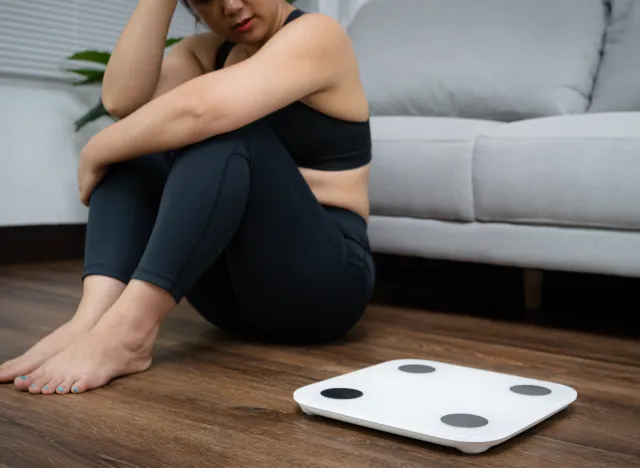
Losing weight is a gradual process that requires hard work, dedication, and patience. It may also involve some trial and error. Depending on how much you want to lose, it can be a while before you achieve results. Typically, it’s safe to lose one to two pounds in a week, Dr. Bohl points out. Keep in mind you may be shedding weight, it just takes a bit of time to actually see a difference. Be patient and not so hard on yourself!





